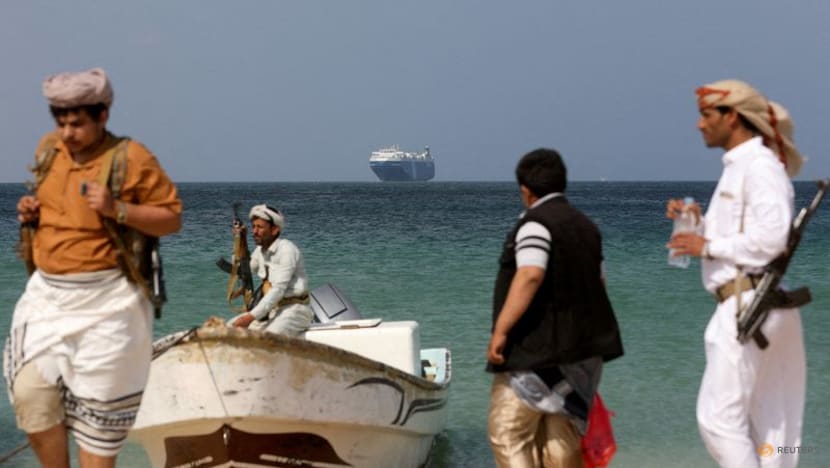Commentary: Singapore takes pragmatic and principled approach to Red Sea crisis
Yemen Houthi militants have kept up attacks on ships in the Red Sea, disrupting international shipping. Singapore’s participation in Operation Prosperity Guardian is unsurprising, say maritime security experts Geoffrey Till and Jane Chan from the NTU S Rajaratnam School of International Studies.


This audio is generated by an AI tool.
SINGAPORE: What has the crisis in the Red Sea have to do with Singapore, half a world away?
On Tuesday (Jan 9), the Singapore government signalled its intention to help deal with the escalating situation in the critical sea lane, with Yemen’s Houthi militants mounting damaging attacks and hijack attempts on ships. Singapore will participate in the United States-led Operation Prosperity Guardian and contribute to Combined Task Force (CTF) 153 which aims to keep the Red Sea open and safe.
Separate from the operation, the White House announced on Thursday that the US and the United Kingdom had conducted strikes against Houthi-controlled areas of Yemen.
Defence Minister Ng Eng Hen told parliament that the immediate impact of Red Sea attacks on Singapore is expected to be limited. But it still makes eminent sense for Singapore to offer help to protect the world’s shipping wherever it is most threatened.
PRINCIPLED APPROACH TO SEA LINES
Singapore’s approach to freedom of navigation and security of sea lines of communication is both pragmatic and principled.
As a critical hub in the global trading system, Singapore’s prosperity and security depend on the safe transit of the commercial shipping on which that system is based. The Port of Singapore hit a record volume of vessels - 3 billion gross tonnage - in 2023.
It is a pressing reality for Singapore, sitting astride another key choke point - the Straits of Malacca and Singapore.
Having been a member of the 39-nation Combined Maritime Forces (CMF) since 2009, Singapore has contributed to international maritime security efforts in support of good order at sea, such as Task Force 151 to counter piracy in the Gulf of Aden.
Dr Ng reiterated the key principles in parliament: While the primary responsibility for maritime security lies with the littoral states, the international community and agencies have a role to play. All measures have to be in accordance with international law and respect the sovereignty of littoral states.
EFFECT ON ASIA TRADE EXPECTED TO GROW
More than 30 significant attacks in recent weeks - including one on Singapore-flagged Maersk Hangzhou - and the hijacking of the Galaxy Leader have made the Red Sea a dangerous place for international shipping.
What started in mid-November as a show of support to Hamas, by attacking vessels the Houthi forces believe to have some connection with Israel, has rapidly degenerated into an indiscriminate and violent attack on global shipping - with no end in sight.
It has forced major shipping companies to send ships around the Cape of Good Hope rather than through the Suez Canal, resulting in much longer transit times and greater fuel, crew and other operating costs. Companies that prefer to take the risk are still saddled with marine insurance rates for war risk that have greatly increased of late.
There are fears the cumulative effect of disruptions and challenges in addition to the Ukraine and Gaza wars could wreak havoc on global trade.
The effects on Southeast Asia, while so far limited, are widely expected to grow substantially and quickly.
The commercial impact of the attacks on the world’s container traffic particularly between Asia, the Mediterranean and Europe, with a simultaneous rush for the Chinese New Year, is worrying since experts suggest that a third of that traffic has already been impacted. Freight rates have jumped and no one can be immune to this.
CATASTROPHIC DAMAGE COULD BE A MATTER OF TIME
But the task Operation Prosperity Guardian faces is not an easy one. The sea area they must cover is contested and the number of protective warships available are still few as nations were initially cautious about participating in such a complex and controversial undertaking.
Its announced aim will be to address security challenges in the southern Red Sea and the Gulf of Aden, with the aim of ensuring freedom of navigation for all countries and so bolstering regional security and prosperity.
They must deal with a variety of Houthi-based threats, including harassment and threatening fire from small boats, armed aerial drones sometimes launched as swarms, and both ballistic and cruise missiles fired from bases in Yemen. It is believed that the location and targeting of merchant ships are facilitated by information provided by Iran which also operates its own warships in the area.
So far many of these drones and missiles have been shot down and the remainder have only inflicted relatively minor structural damage. No crew deaths have been reported. But this could only be a matter of time.
Moreover, most recently a grave new threat has emerged - that of a semi-submersible sea-based drone. These are particularly dangerous as they are very hard to see and destroy, and designed to hit their target at the waterline, its most vulnerable point.
Should such a drone strike a large container ship or oil or gas tanker, the damage could be catastrophic with ships sunk, crews killed and appalling environmental consequences.
ESCALATION IS A POOR ALTERNATIVE
Warship numbers and the schedules of individual shipping companies will not allow regular convoying for protection. So, Operation Prosperity Guardian will most likely be conducted by means of carefully chosen and patrolled shipping routes, with concentrations of naval forces in areas where the threat is considered to be at its highest.
Although this is a complex, demanding and expensive task, escalating the response may be a dangerous alternative.
With the US and UK having launched first strikes against targets linked to the Houthis, any retaliatory action could endanger the precarious ceasefire in the Yemeni civil war and runs the risk of widening still further the conflict already engulfing part of the region.
So both by defending the trading system on which the whole world depends and trying to limit the dangers of an even greater war in the area, Operation Prosperity Guardian is an important exercise in the defence of global peace and prosperity.
Small states like Singapore can do their part too. As a small island state that depends on the global maritime system for its security and survival, Singapore must do what it can to support and uphold the multilateral rules-based system.
Geoffrey Till is Professor and Adviser to the Maritime Security Programme and Jane Chan is Senior Fellow and Coordinator of the Maritime Security Programme, at the S Rajaratnam School of International Studies (RSIS), Nanyang Technological University (NTU), Singapore.




















